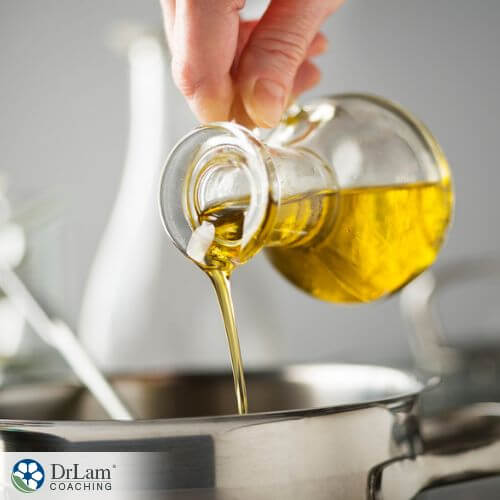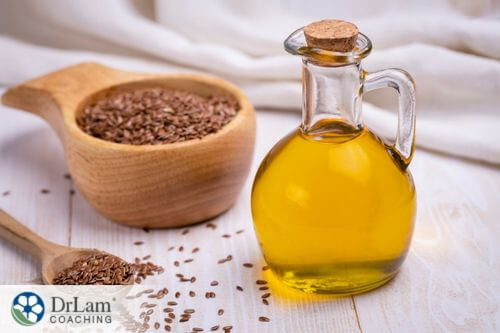 For years, health gurus have claimed fats were bad for you - all fats, no matter their source. Yet the truth is that fat is an essential part of a healthy diet. While this does not mean you consume large quantities of fat, you most certainly can opt for healthier fat options. And this includes oils to cook with.
For years, health gurus have claimed fats were bad for you - all fats, no matter their source. Yet the truth is that fat is an essential part of a healthy diet. While this does not mean you consume large quantities of fat, you most certainly can opt for healthier fat options. And this includes oils to cook with.
Oils to cook with include olive, avocado, sunflower, and many other oils. We use them to cook with, fry with, bake with, and drizzle over our salads. When used for cooking, you should consider their smoke point as well as whether the fat is saturated or unsaturated.
Certain fats have a lower smoke point, i.e., the temperature at which they start to burn. Once the oil reaches its smoke point, it loses its flavor and nutrients and could even release free radicals.
As to how healthy fats are, you should rather opt for monounsaturated and polyunsaturated fats and stay away from saturated fats. Do note, however, that saturated fats are not always necessarily bad for you.
This guide will cover some of these factors for various cooking oils in depth, so you can decide the best oils to cook with for yourself.
While you may see a wide selection of oils to cook with on the shelves when shopping, these oils do not have equal health benefits.
One of the main considerations when choosing oils to cook with is their smoke point. Many oils start to break down when they reach this smoke point, oxidize, and release harmful free radicals. Free radicals can cause harm at a cellular level which could result in health issues.
The best oils to cook with are usually saturated and monounsaturated fats, which have a high smoke point. Polyunsaturated fats have a low smoke point, and you should avoid them when cooking at elevated temperatures.
One of the substances released when oil reaches its smoke point, acrolein, results in a burnt flavor. Also, once in the air, acrolein may cause lung damage.
Another factor to keep in mind is how much processing an oil has been subjected to. While highly refined oils are often cheaper with a more uniform appearance, they may lack in quality. On the other hand, unrefined oils have a cloudier appearance but also tend to have more flavor and nutrients. They do, however, tend to be more heat sensitive and prone to becoming rancid more quickly than highly refined oils. The smoke point of refined oils tends to be much higher than their unrefined counterparts.
Finally, some oils are just healthier than others. This is due to the nutrients in them, including the type of fatty acids they contain.
 The choice of the best oils to cook with largely depends on what you want to use them for. If making French fries, for example, you would need an oil with a high smoke point. An oil with a low smoke point would start to burn and release free radicals. In contrast, some nutrient-rich oils with a low smoke point might work better in salads or dips, where they are not heated. Also, some oils have a higher nutrient content and help fight free radicals and even possibly lower cholesterol.
The choice of the best oils to cook with largely depends on what you want to use them for. If making French fries, for example, you would need an oil with a high smoke point. An oil with a low smoke point would start to burn and release free radicals. In contrast, some nutrient-rich oils with a low smoke point might work better in salads or dips, where they are not heated. Also, some oils have a higher nutrient content and help fight free radicals and even possibly lower cholesterol.
Olive oil is probably one of the most popular, healthy, versatile oils to cook with. It is also great to bake with or use as a condiment. Olive oil labeled "extra virgin" is best because it is neither overly processed nor refined. Furthermore, it is high in monounsaturated fats and also contains polyunsaturated fatty acids that promote heart health.
You can use olive oil in low-heat cooking because it has a smoke point of around 350 degrees Fahrenheit. It is thus not suitable for high-heat cooking like deep frying.
You may also have seen stores selling light, pure, or regular olive oil. Here we see extra virgin olive oil processed to get rid of its distinct flavor. However, it also creates a higher smoke point of up to 370 degrees Fahrenheit and is suitable for cooking at a higher heat. Many people choose this olive oil version for making infused oils. However, it is best to use olive oil raw if possible.
Avocado oil, considered by many one of the healthiest oils to cook with, is high in healthy monounsaturated fat and polyunsaturated fat. Furthermore, the oil has a high vitamin E content and a higher smoke point than most other oils for cooking. Unrefined avocado oil has a smoke point of 480 degrees Fahrenheit and refined that of 520 degrees Fahrenheit.
Because the oil does not have much flavor, it is a good option for most types of cooking.
Much controversy exists about coconut oil as one of the oils to cook with. Although relatively high in saturated fat, this heat-resistant fat has many health benefits. It can boost your metabolism, help improve your cholesterol levels, and has antibacterial properties as well.
Virgin coconut oil, with a smoke point of 350 degrees Fahrenheit, has a coconut flavor and can be used in baking. Refined coconut oil has a higher smoke point of 450 degrees Fahrenheit. It has a mostly neutral taste and is suitable for roasting or sauteing.
Real, unprocessed, organic butter contains fatty acids that fight inflammation as well as vitamins A, E, and K2. When heated, you can skim off the bubbly portion and cool down the remaining butter fat or ghee. Ghee contains no proteins or sugars.
Butter has a smoke point of 350 degrees Fahrenheit and is suitable for baking and sauteing. Ghee has a smoke point of 465 degrees Fahrenheit.
This oil with its nutty flavor is overly sensitive and should not be exposed to heat. It is best used in a vinaigrette or to finish soups.
With a relatively high smoke point of 420 degrees Fahrenheit, this oil is often used in restaurants as it compliments other flavors. It does not detract from other flavorings like herbs or spices.
Boasting a mostly neutral but slightly nutty flavor, refined sesame oil is regarded as one of the general-purpose oils for cooking. The high smoke point of 410 degrees Fahrenheit makes it ideal for roasting and sauteing. It is also used as a condiment, in sauces, and in marinades. This oil is high in antioxidants and monounsaturated fat.
 Flaxseed oil is high in omega-3 fatty acids. These fatty acids help lower blood pressure, promote heart health, and help address the triglyceride levels in your blood. It is advised that you do not heat this oil but rather use it to add flavor to your dishes.
Flaxseed oil is high in omega-3 fatty acids. These fatty acids help lower blood pressure, promote heart health, and help address the triglyceride levels in your blood. It is advised that you do not heat this oil but rather use it to add flavor to your dishes.
Walnut oil, with its exceptionally low smoke point of 225 degrees Fahrenheit, is not suitable for cooking although it can be used in various other ways. Boasting a good omega-6 to omega-3 fatty acid ratio, the oil can help fight inflammation. The oil is often added to coffee drinks or drizzled over freshly sliced fruit or ice cream.
Peanut oil, often used in Asian foods, contains both saturated and unsaturated fats. When unrefined, the oil has a smoke point of 350 degrees Fahrenheit and has both a strong smell and flavor. It is also great in marinades.
The refined version of the oil has a much higher smoke point of 450 degrees Fahrenheit and is widely used in the food industry for deep frying, for example, fried chicken or French fries.
The term "vegetable oil" refers to oil made from a plant source. Most oils labeled "vegetable oil" are a blend of different oils. The most common oils used to make vegetable oil include canola, palm, sunflower, corn, and soybean oil.
Vegetable oils have been both refined and processed as well. They may be pushed past their individual heat tolerance and lack not only flavor but also nutrients. These oils, often labeled only as "vegetable oil", can be either one or a combination of any vegetable oil. The packaging need not indicate which oil exactly.
Vegetable oil is generally good for cooking on high heat as the smoke point is about 400 degrees Fahrenheit. You cannot determine the exact smoke point because it depends on the oil or oils used in its making. We can, however, take a look at the individual vegetable oils for cooking and discern their properties and uses.
With a smoke point of about 450 degrees Fahrenheit, this oil is suitable for frying. It is also often substituted in place of butter in commercial bakeries. This oil is high in saturated fat.
The neutral flavor and high smoke point of 450 degrees Fahrenheit make corn oil a firm favorite in commercial kitchens. Its low cost is also a contributing factor. You can use this versatile oil for both high-heat cooking and baking. However, corn oil is highly processed and not particularly healthy as it's an inflammatory food.
Each tablespoon of sunflower oil contains thirty percent of your daily recommended vitamin E intake. Vitamin E is a powerful antioxidant. However, the oil is high in omega-6 fatty acids. While important for your body, consuming too much of this fatty acid could promote an inflammatory response.
The smoke point of sunflower oil, 450 degrees Fahrenheit, makes it great for all types of cooking and baking. Furthermore, its mild flavor does not interfere with other flavors when cooking.
Canola oil contains both monounsaturated and polyunsaturated fats including omega-3 fatty acids. It contains very little saturated fat. The oil also has a high smoke point of 450 degrees Fahrenheit. This makes it suitable for high-heat cooking.
However, the canola oil found in the United States tends to be highly processed. As a result, it tends to have much fewer nutrients than when cold-processed or unprocessed. Although you can purchase cold-pressed or unprocessed canola oil, it is rare and difficult to find on shelves.
One of the main reasons you need to incorporate fat and oils to cook with in your diet is because of your body’s inability to make essential fatty acids. The fatty oils found in oils to cook with help your body absorb vitamins A, D, and E. Together, these vitamins boost your immune system and fight free radicals.
As with all things, moderation is key. A healthy diet should include fats and/or oils in moderation as too much can have an impact on your Bioenergetics Circuit.
 Your Bioenergetics Circuit is one of six circuits forming your NeuroEndoMetabolic (NEM) stress response. Governed by the Hypothalamic-Pituitary-Adrenal (HPA) axis, the NEM stress response drives all body responses when you encounter stress. Many factors can cause your NEM stress response to become unbalanced. When this happens, you may experience adrenal fatigue and many associated health issues.
Your Bioenergetics Circuit is one of six circuits forming your NeuroEndoMetabolic (NEM) stress response. Governed by the Hypothalamic-Pituitary-Adrenal (HPA) axis, the NEM stress response drives all body responses when you encounter stress. Many factors can cause your NEM stress response to become unbalanced. When this happens, you may experience adrenal fatigue and many associated health issues.
Your Bioenergetics Circuit consists of the pancreas, liver, and thyroid gland. Together, these three organs see to your body’s energy needs. If your Bioenergetics Circuit becomes imbalanced, health issues may arise like obesity, gut bacteria imbalances, and blood sugar problems. All these issues relate to metabolism.
Fats, in any form, are used by your body to generate energy, and they are the most energy dense of the three macronutrients. However, after using all the energy your body needs from foods, any excess will likely be stored in the form of fat. To burn fat, your energy output needs to outweigh your energy input.
One of the main hallmarks of a Bioenergetics Circuit imbalance is chronic inflammation. This is often also associated with higher cholesterol levels. Certain oils to cook with may influence your cholesterol levels or promote an inflammatory response.
When choosing oils to cook with, the type of fats they contain also influences their inflammation risk.
Monounsaturated fats help with the development and maintenance of all cells in your body. These fats also help lower your LDL (low-density lipoprotein) cholesterol. LDL cholesterol, often referred to as bad cholesterol, can increase your heart disease or stroke risk if present in high concentrations. These fats may also reduce inflammation.
Polyunsaturated fats can also help with cholesterol control by addressing LDL levels. Two polyunsaturated fats often found in oils to cook with include omega-3 fatty acids and omega-6 fatty acids.
Omega-3 fatty acids may help reduce your blood’s triglyceride levels, lower blood pressure levels, and slow plaque buildup in your arteries. Because of the anti-inflammatory properties of omega-3 fatty acids, they may prove helpful in addressing inflammatory and autoimmune conditions.
Omega-6 fatty acids may help reduce blood pressure levels and control blood sugar levels. It may thus help reduce your diabetes risk. These fatty acids, however, tend to promote inflammation. You should thus strive to keep a balance between omega-3 and omega-6 fatty acids when choosing oils to cook with and through other fats in your diet.
Finally, while saturated fats have certain health benefits, you should take note that too much of these fats could increase your risk of heart disease by promoting higher cholesterol levels. These fats could also produce an inflammatory response. It is best to avoid them if suffering from inflammatory and autoimmune health conditions.
While there are many oils to cook with available on grocery store shelves, it is clear that not all of these oils are equal. Some are more nutritious than others, while others have higher smoke points and are better for high-heat cooking jobs, like roasting or frying. This means different oils are better for different types of cooking.
If you would like to know more about the different ways to maintain a healthy, balanced diet, the team at Dr. Lam Coaching can help. We offer a free** no-obligation phone consultation at +1 (626) 571-1234 where we will privately address any questions or concerns you may have. Alternatively, you can send us a question through our Ask The Doctor system by clicking here.
Various oils to cook with can affect adrenal health, either in a positive or a negative manner. It depends on the type of fat in the oil. Fats can influence issues associated with adrenal health like inflammation and cholesterol. Some fats can help reduce inflammation and cholesterol, while others make them worse.
